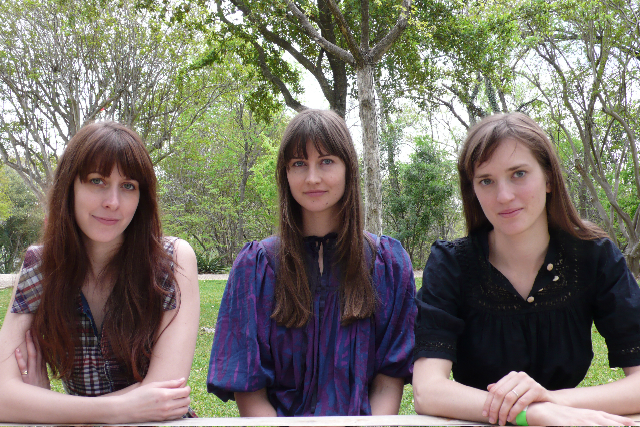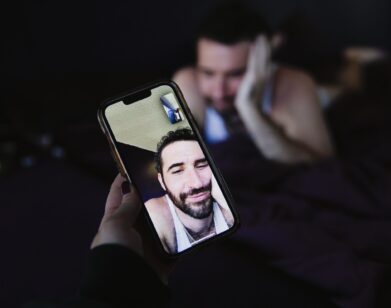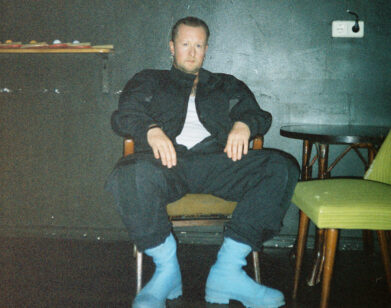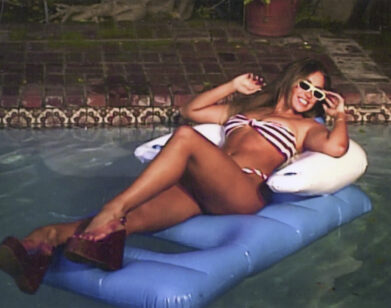Hello Again, Au Revoir Simone

Photo by David Coggins.
Infectious synth-pop trio Au Revoir Simone (Erika Forster, Annie Hart, Heather D’Angelo) hail from Brooklyn, and they’re about to release their third album, Still Light, Still Night. It’s their first studio record in two years, full of infectious bittersweet songs, which they previewed during a smart set at Maggie Mae’s Rooftop during South by Southwest. We met up the next day on the very civilized grounds of the historic French Legation. In their late 20’s, the band members are all tall, fair, and have long dark hair—but don’t ask them if they’re a girl band, or sisters.
DAVID COGGINS: What’s it like playing here as opposed to New York?
ANNIE HART: It used to make me more nervous to play in front of people I knew—it was like playing before people I’m going to see tomorrow.
ERIKA FORSTER: People’s attention spans are so short here-you’re only playing about half an hour.
HEATHER D’ANGELO: I prefer shows where the audience is strangers-they’re not there because they know me, they’re there because they like the music.
DC: So you want to be sure your friends aren’t showing up out of social protocol?
HD: Right.
DC: How are you preparing for the release of the new album?
EF: I’m actually going to Hawaii for five days to visit my mom.
AH: She’s going to learn to surf.
EF: It’s the year of trying new things.
DC: What’s it like playing the new songs?
HD: There’s a more visceral response to them.
AH: Maybe it’s because we’re so excited to play them that we’re projecting onto the audience, but they seem excited.
EF: We saw a Peter, Bjorn and John show the night before we came out here and they played mostly new songs and it was pretty awesome.
DC: When you’re in Austin are you seeing other bands?
EF: I saw one of my favorite bands, Camera Obscura.
AH: I took an epic nap and had an adventure with a security guard and a séance.
HD: I think we called that ‘creeping for sleeping.’
DC: I like not knowing what that means.
AH: We saw Casio Kids, and this amazing band from Austin, Faulty Chromosomes.
DC: So you still have time to discover new music.
HD: Sometimes it just comes naturally. Like the band that played right before us last night, Esser, were great.
DC: What was it like last night playing with people walking by the stage to get to the restrooms?
EF: Was that why there were people backstage?
DC: Yes indeed. What do people ask you about yourselves?
HD, EF, AH [in unison]: ‘Are you sisters?’
EF: We’ve literally gotten that question 40 times.
AH: Sometimes it’s ‘Are you triplets?’
HD: We look like sisters like all white girls look like sisters.
DC: So it’s tedious that people obsess over your looks?
HD: People ask us what it’s like being in a girl band.
EF: Yesterday I told somebody I was in a band with these two and they said ‘and who else?’
HD: Or when we show up at a club and they ask if we’re the girlfriends of the band. That happens all time-or it used to.
DC: I think that one reason that people might ask about a girl band-which is silly-is that you seem to like each other. When you’re performing you seem to be enjoying it. It’s refreshing.
AH: Our band came together because we wanted to hang out together. The origins of our band is liking keyboards and liking each other.
EF: That’s the best way of getting to know each other-doing projects. We’re family at this point. It’s especially nice in New York City, having people close to you.
HD: I like to think of when we’re 80 and say ‘Remember when we toured the world together?
DC: Were you always partial to Roland keyboards?
AH: We used to use Casios-really cheap instruments.
EF: We just gathered instruments and then got more expensive tastes.
HD: We’re children of the 1980’s. My first memory of the keyboard is Ferris Bueller.
DC: Where it’s imitating his snoring.
HD: I thought that was the coolest thing ever.
AH: Or Big, when Tom Hanks is dancing on the big keyboard.
EF: They weren’t the serious sounds of the previous generation. We were thinking about sweeter lighter sounds, like Madonna pop.
AH: We had these Casio SK 1’s that you could sample. I played it all the time. They become part of your culture. The three of us compose together a lot and the sounds that we make become like meditation.
EF: We’re trusting that more and more. The songwriting is becoming easier.
AH: It took us a really long time to write and record our record-over a year. I feel like this record felt right for us.
DC: Can you talk about the division of labor in the band?
EF: It’s a free for all. Some songs are written collaboratively, some songs are written by one person. We trade off lead vocals. Heather does all the drums, but we all have a say about what gets programmed into it.
DC: Does anyone have a reputation for being very particular about a certain thing?
HD: I think we all have our things. I’m obsessed with bass and rhythm.
AH: I’m a drum Nazi.
EF: I’m obsessed with regional accents.
HD: Annie’s from Colorado and we’re from Long Island and New Jersey, our parents are Italian-Brooklyn. Erika is good at melody, Annie’s good at layering and making things lush.
AH: One of the things I want to have on our next tour is cameras on our hands so the audience can see how these hands create these sounds and interact with each other, because we don’t use samples.
DC: Is one of you a DJ?
In unison: We all are.






